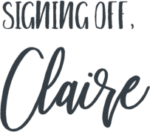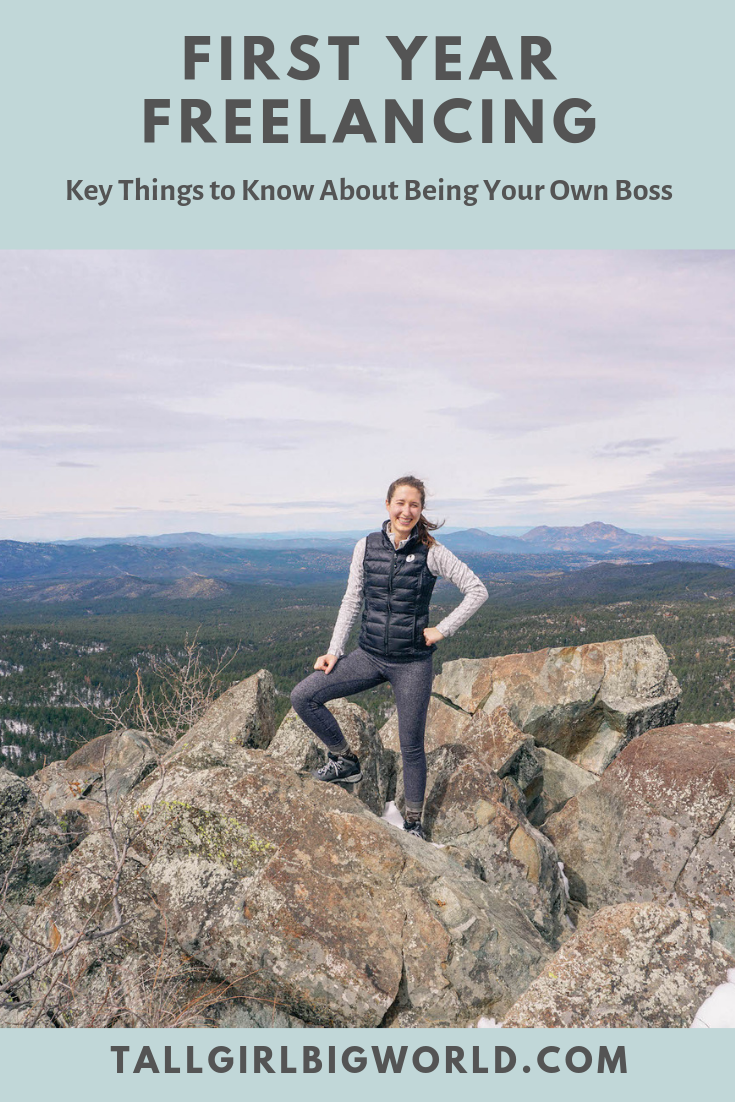I knew my first year of freelancing would be difficult, but I had no idea how much I’d learn, grow, and develop because of it. Here are the key takeaways I wish I’d known before starting my freelance journey.
Exactly one year ago today, I experienced the hardest day of my entire life. Like every workday prior, I woke up early, inhaled my morning bowl of oatmeal, then hopped on the bus to Manhattan so I could hit the gym closest to my office before scurrying to my desk to get started on the day’s work. Except instead of getting straight to work, on this particular day I had a calendar notification waiting in my inbox notifying me that I had a meeting scheduled at 9:30am — a mere 10 minutes from the time I walked into the office. Uh-oh, did I forget I had a meeting? I checked the meeting details, and it felt like I’d swallowed my heart. The only other people attending the meeting were my boss and an HR representative.
Within 30 minutes of arriving at the office, I was being told that “your work ethic hasn’t gone unnoticed,” but “unfortunately we’re having to make some cuts.” Somewhere around discussing my severance package, my brain switched off and I focused solely on my breathing. Don’t cry don’t cry don’tcrydon’tcrydon’tcry. (Spoiler: I cried).
Note that I didn’t call this the worst day of my life — far from it. Hard? Oh yeah. But not the worst. I’ll admit, being laid off didn’t feel like a blessing at the time, and it took me a few weeks to fully process just how much being laid off changed my life. But once I came around to the idea and accepted that being jobless was my new normal, I warmed up to the idea. I gave myself time to decompress, took a fabulous trip to Greece with my mom, and returned to NYC excited to tackle this next chapter in my life: freelancing.
What made me decide to freelance? On the day I was laid off (the day before my birthday, of all things), I went to a local coffee shop with a few colleagues who’d also just been let go. After sitting in silence for some time, one of them finally spoke up and asked what we all would do now. Without thinking, I blurted out “I’m moving to Germany!”
Blank stares. “What did you just say?”
Without my realizing it, my subconscious had been hard at work figuring out my next steps. The idea of moving to Germany took root, and when I returned home from Greece I started researching how the heck an American citizen could be allowed to live in Germany long-term. I stumbled upon the freelancer’s visa, and the rest, they say, is history. Little did I know that freelancing would wind up being one of the most difficult, scary, rewarding things I’d ever do.
Despite the fact that I asked as many people as I could think of for advice on becoming a freelancer, there are still so many things I wish I’d been told before I jumped into this unconventional career path. So here I am, writing down all the things I wish I’d been told about freelancing a year ago. This post is long (I had every intention of keeping it short, I swear), but this is one of those posts that I wrote for myself as much as for you. I wanted to have something to look back on when I face challenges in the future. This is my reminder to all of us that you can do whatever you set your mind to, as long as you’re willing to work really stinking hard for it.
Finding Your Niche is Crucial
The first month I started freelancing, I was at a loss at what I should do. There were so many things that I could have done — I was a college educated woman with three years of professional editing experience under my belt, after all — so it was more a question of what I actually wanted to do. When I decided to begin freelancing, I told myself I wouldn’t accept jobs I wasn’t interested in because I wanted to actively build my dream life. So I began my freelance career utterly confused about what I really wanted to do with my life. It felt like I was graduating college all over again. I had all these useful skills I felt confident about pitching to potential clients, but I wasn’t sure who to pitch, what skills to showcase, or even how this whole freelancing thing even worked.
Fast forward to about a month into my so-called “freelance career” (I use quotation marks because I think I made maybe $80 total that first month), and a client I’d formerly interned with kindly roped me into an email chain with 10 (!!!) other people who were interested in hearing about my services. The client who made the intro runs a popular food blog, and everyone on the email chain had blogs as well. As scary as it was to suddenly have to pitch myself to 10 people I’d never met before, it was such a blessing because it pretty much decided for me what type of niche content I’d be working on: food blogs!
I’m so incredibly thankful that I found my freelance niche early on. I’ve connected with a handful of freelancers over the last few months, and so many of them have the same story: they decided to try their hand at freelancing, and spent the first year or two taking on any odd job that came their way. This resulted in lots of stress, because they felt like they had little control over their work and weren’t developing their skills very rapidly. Because I knew pretty much from the get-go that I wanted to keep working with food bloggers, I felt more confident in pitching myself to new clients after I’d successfully completed my first few projects. Finding potential clients was also much easier because I’d significantly narrowed down the pool of people I wanted to work with.
Think of it this way: when you move to a new city, would you settle for living anywhere at all within its boundaries? No way! You’d give yourself time to explore the different neighborhoods, and would eventually focus your apartment search in one particular area. The same logic applies to freelancing!
You Can’t Assume a Client Knows What They Need
Remember those first 10 prospective clients I was connected with? I don’t think I slept at all that week. I was TERRIFIED at the thought of having to answer all their questions over the phone. What if they thought I was dumb? What if they asked questions I couldn’t answer? What if they wanted work done that I couldn’t handle?
In the end, my world didn’t implode, no one screamed at me over the phone, and, yes, I actually landed some clients. You want to know how most of our phone conversations went?
“So and so told me you have editing experience and are trained in SEO.”
“Yes ma’am, that’s true.”
“I don’t understand how SEO works. What do you think I should do?”
After a few of these phone calls, it dawned on me that, hey! I know all about SEO! I was trained in it at a professional level! I can write, edit, and optimize content for search engines! Contrary to what the Doubting Debbie in my mind might have whispered to me, I’m not an idiot!
This is the moment when everything clicked into place and I realized that what most clients really want is advice. They want you to explain what needs to be done, and then do it for them. After those first phone calls were finished, I spent the next few weeks mapping out my processes and figuring out how I could best explain to new clients what I do, why it matters, and how it’d help them in the long run. Having a set list of services that I offered and examples showcasing how it’d benefit them made it easier for people to say yes to my services and made both of our lives’ easier.
Setting Boundaries Helps Everyone
Do you remember how annoyed you used to get with your parents as a kid when they’d remind you of the house rules? You only get one hour of TV time a day, be home by 9pm, you can’t play with your friends if you don’t finish your chores, blah blah blah. And then remember how you were talking with your best friend just last week about how thankful you are that your parents raised you right and shaped you into the mature, responsible woman you are today? Yeah, you wound up that way because your parents set boundaries and made sure you didn’t turn into a lazy blob of a human.
Freelancing is the same thing, only different. When I first starting working with clients, I was hesitant to ask for feedback on projects by a certain date, despite the fact that I needed to hear back from them on certain things so I could complete my work for them in a timely manner. I’d wait in agonizing anticipation for their response, convinced that if I followed up with them “too soon” they’d be annoyed that I clogged up their inbox. This resulted in lots of stress on my end, as well as minimal communication between my clients and I.
After a heart to heart about my freelance struggles with my friend Caroline, she pointed out that so many of my freelancing pain points would be solved if I just set clearer boundaries with clients.
Please let me know your thoughts by Wednesday; I’ll get back to you no later than Monday EOD with an answer; Email is the best way to communicate with me.
These few simple phrases totally rocked my world. Suddenly, I was getting responses from clients within 48 hours, which meant that I could complete projects ahead of schedule and focus on future work earlier than anticipated. Score! I’ve learned that setting boundaries with clients and clearly but concisely explaining what you need from them makes you appear more trustworthy and professional. It also makes it easier for them to make decisions and get you the things you need because you’ve laid everything out for them. They’ve got a lot on their plate, so it’s best to make things as easy as possible!
‘Hustling’ Doesn’t Have to Mean Overtime
I think the worst thing you can do as a freelancer is over work yourself. Yes, you need to be willing to hustle to pitch clients, get contracts signed, and make enough money to support yourself. But I see no reason to work weekends or stay up until midnight to meet project deadlines. If you find yourself in a situation where you’re working non-stop and are quickly developing burnout, take a look at your business setup. Are you charging enough money? Are you experiencing the dreaded “scope creep” (i.e. where you agree to take on additional tasks for clients, but didn’t update the contract and your rates to ensure you’re paid accordingly).
Personally, I think that if you’re stressed to the max and are working insane hours, you’re not freelancing the right way. I don’t want you to think I’m judging you — I’m not. I just want to encourage you to reevaluate how you’re freelancing and take the necessary steps to rebuild a freelance business that you’re genuinely happy with.
When I first started freelancing, I would squeeze in a few hours of work “here and there” on the weekends and in the evenings. And before I knew it, my work boundaries were completely blurred and I couldn’t relax if my computer was turned on. When I was home for Christmas, I created a work calendar so that I could plan my tasks a month in advance. Having my game plan mapped out weeks ahead of time kept me from worrying when I’d get things done. Now, whenever I’m stressed about completing a project, I just open up my work calendar and look back over the project breakdown I’ve assigned to myself.
Creating Work/Life Balance Takes Practice
In a similar vein, figuring out how to balance freelance work with my real life (and this blog!) took so much time. I think it was doubly difficult for me because I work from home and don’t commute to a coworking space or anything like that. Looking back to where I was a year ago, I wish I could tell my younger self that creating long-term work/life balance takes patience and practice.
Why practice? Because you have to practice shutting off the work side of your brain and turning on the relaxation side of your brain every. single. day. There’s no freelancing police that will fine you for checking your work email five times on a Sunday. No one will slap you on the wrist for compulsively working on projects that aren’t due for another two weeks. It’s up to you to create your own boundaries and actually stick to them.
But those boundaries likely won’t be established within the first few weeks of freelancing, and that’s okay. You need time to figure out what works for you and what doesn’t, schedule-wise. Give yourself time to grow and adapt to your new reality, while reminding yourself that this is just a phase and that you absolutely must establish boundaries some time soon — you deserve to have a life and see your friends on the weekend without worrying about the work that’s waiting for you at home. Remember: those emails and projects and deadlines can wait until Monday for your attention.
The Worst They Can Say is ‘No’
When I first began pitching prospective clients, my hands would shake every time I sent an email. I placed so much value on their answers, and when I’d receive a “No thanks” in return or — worse — wouldn’t receive a response at all, I’d be crushed. I assumed that their lack of interest in my services was my fault, that I must not be offering a useful package or was doing something wrong. But now I realize that I was actually doing all the right things, and that the people I was pitching simply didn’t require my services.
A full year later, I now know that the worst thing a potential client can say is ‘no.’ And you know what? The world will keep on spinning despite the fact that I didn’t land a contract I would’ve liked to. Do you know how many cold pitch emails I sent before I finally secured a full roster of clients? 65. I sent 65 emails before I secured enough contracts to meet my goal monthly income. It took me almost nine months of hard work to reach that point, and over time I learned to accept that not everyone needs or wants to work with me, and that’s totally okay. You just have to keep moving forward and know that at some point everything will work out because you worked hard to make it happen.
Asking for Help is a Must
I would not be where I am today had I not asked for help and advice from easily a dozen plus different women. I had absolutely no idea how to begin freelancing, how to draw up a contract, how to accept payment from clients, NOTHING. During the first two months of freelancing, I think I met two or three new people a week for coffee in hopes of getting their advice on whatever I was struggling with at the moment. I didn’t meet up with people with the intention of getting something out of them or asking for favors. I went in with an open mind and lots of questions, and I was blown away by how willing people were to help little ol’ me in my journey to become a real live freelancer.
My main piece of advice is this: tell everyone you know what you want to do as a freelancer. Tell them you’re looking to connect with like-minded people who have been down this path before. And then keep reminding everyone in your life that you’re doing this thing and you need help. I put a blast out on Facebook announcing this new venture in my life, and I had a couple people reach out to me weeks afterwards saying they’d just met so and so who’s a freelancer, and would I like to connect with them? It’s crazy how these sorts of things come full circle. So don’t be afraid to reach out to others who have been in your shoes or even to people who you can’t see how they’d possibly be able to help you. You just never know how life will pan out!
Talking About Money is Essential
I’m one year into freelancing, and I still HATE talking about money. I hate with a capital H discussing my rates, how I set my rates, what other people’s rates are — just everything about money. I’m not sure why talking rates and finances sets my teeth on edge. It may be because I grew up in a family where money matters are very hush-hush. Case in point: I’m almost a quarter of a century old, and I have absolutely no idea how much money my parents make. Like, I can’t even ballpark it. (Or maybe that’s normal?).
But me hating talking about money is just one layer of this onion of an issue. To make matters more challenging, none of my friends were freelancing when I started my business, so I felt like I had no one to consult when setting my rates. I basically just pulled a number out of thin air and thought, hey, some money is better than no money, amiright?
Looking back, I wish I had just gotten over my weird money issues and asked my friends for advice. A former colleague of mine started her own consulting business a few months back, and I brought up my rates dilemma with her when we met for coffee. Coincidentally, that ex-colleague had been the HR person at my work, so she remembered exactly what I had been making at my old job. She whipped out her phone calculator and worked backwards to determine what my hourly rate should be, factoring in my new need to pay for health insurance and cover taxes, etc. It was much higher than the rates I’d set for myself, but the entire conversation was so soothing, in an odd way. I’d finally surged past the hurdle of discussing money matters and felt like I could air everything out. Before I knew it, questions were pouring out of my mouth faster than she could answer them. The next day, I updated my rates sheet and I now charge clients what I’m really worth.
Learn from my mistakes and get comfortable with discussing money matters early on. It will only benefit you in the long run and will ward off any doubts about what you’re really worth.
Compile Materials Before You Have Clients
A pitfall so many freelancers fall into when they first start working for themselves is, “Oh, I’ll cross that bridge when it comes.” This is a terrible idea! You need to sit down right now and prep all the materials you’ll possibly need to grow your freelance business. I don’t care if you have clients or not, you absolutely do not want to be scrambling to throw together a cold pitch email or a contract template at the last minute. You’ll only stress yourself out, and you’ll likely overlook other important to-do’s in the process.
Before I was cc’d on that fateful 10-person email chain, I sat down and prepped a list of skills I had to offer new clients, I figured out my hourly rate (which was way too low, but we’ve been over this already!), I found a contract template online and tweaked it to fit my needs, and I drafted email responses for all the situations I could see myself getting into (cold pitch emails, follow up emails, etc). Having those materials prepped in advance made it easier to deal with new freelance challenges as they arose.
Because here’s the thing: you’ll never stop learning as a freelancer. I’m only a year in, and I’ve already realized that projects will be ever-shifting and new obstacles will forever present themselves, but because I have my core materials locked and loaded, I feel more confident in my ability to tackle new challenges. You may feel dumb prepping materials before you have any clients, but being prepared is what will make you a stellar freelancer.
Price Higher Than You Think You Should
You will naturally undersell yourself, it’s a fact. I’ve yet to meet a single freelancer who priced herself just right when she accepted her first client. It feels like some anxiety-inducing freelance rite of passage to drastically undercharge for your services, only to learn the error of your ways a few months later. And guys, I know it’s so much easier to tell you to charge more than it is to actually do the darn thing. You’ll probably doubt yourself, or you’ll have prospective clients try to haggle your rates lower, or some combination of the two. DON’T GIVE IN. If you think your services are worth $35/hour, charge $45/hour. Remind yourself that you are now your own accountant, your own health care provider, and your own manager. Again, ask your friends for their input; join Facebook groups and ask other freelancers for their opinion.
Remember: the worst thing someone can say is that they don’t want to work with you. If they tell you it’s because they can’t afford your rates, that’s not your problem. You need to make a living, and new clients that can afford to pay you what you deserve will come along.
The First Year Really is the Hardest
I feel like I’ve written a novella already, so I’ll keep this short. When I started freelancing, people kept telling me that the first year would be the hardest. And just like getting your wisdom teeth removed or writing your undergraduate thesis, you simply can’t understand how tough freelancing can be until you start. So yes, this first year of freelancing has been the hardest thing I’ve ever done in my life. But it’s also been the most rewarding. I honestly had no idea I was capable of building a business, but here I am doing it.
If you’re considering going freelance, my main tips for getting through your first year are to save up a few months’ rent so you have some financial cushioning, network your little tushy off, and remember to celebrate your victories along the way, no matter how small they may seem.
Alright, sorry for the 3,000-word blog post. I didn’t think I had that much to say, but apparently I did. I really wanted to jot down all the things I wish someone had told me before I started freelancing, and I hope this helps some of you out on your own freelance journey.
Tell me: What’s one lesson you wish you’d learned sooner in life?
More posts you’ll love:
- 5 Apps for Keeping in Touch with Long-Distance Friends
- 10 Useful Tips for Taking Your First Solo Trip
- What It’s Really Like to Work at a Dude Ranch
- My Top Tips for Traveling With Your Parents as an Adult














Comments & Reviews
Thank you for writing this post Claire. It is so reassuring especially for someone who’s been starting for years as a freelancer but has yet to start out.
There is hope.
Thanks for your post. It’s really inspiring story and somehow I believe will help a lot of people. I’ve been in a year of wondering what I want before I relocate to Germany a year and a half ago. It’s hard but it’s worth. Wish you all the best and keep writing.